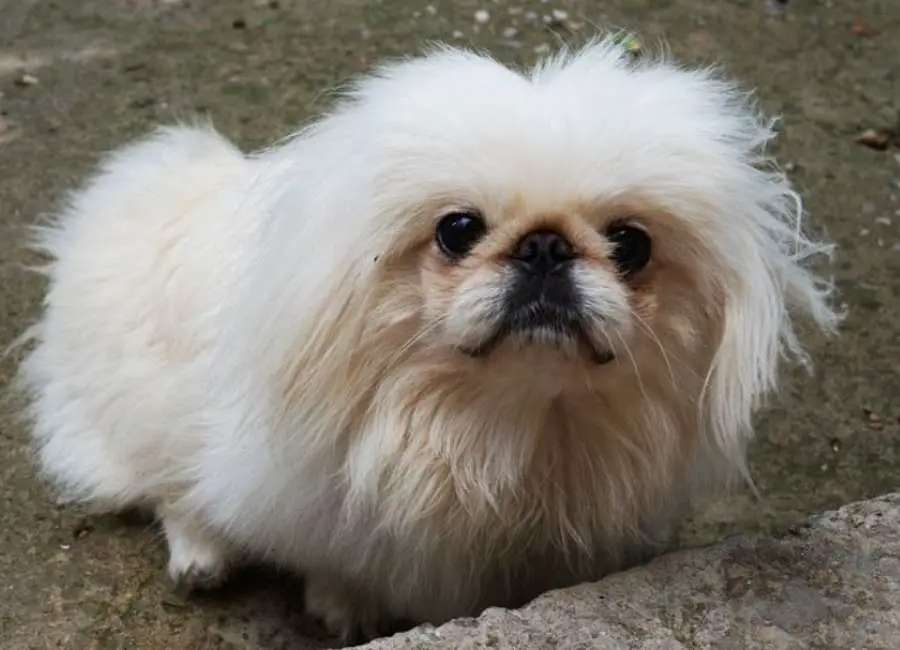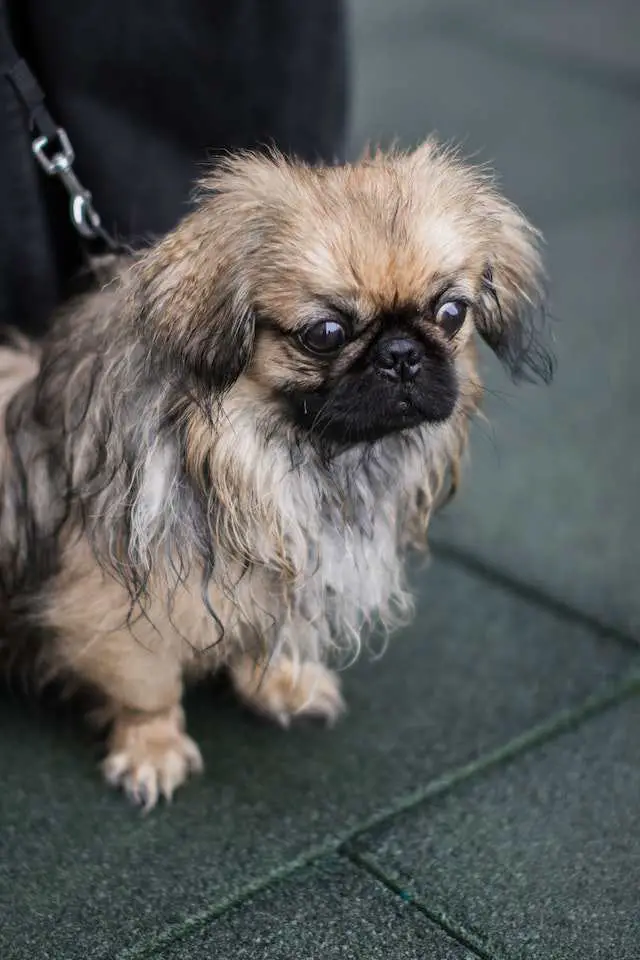7 Common Causes of Pekingese Shedding & Tips

Most Pekingese owners are worried about Pekingese shedding probably because of their long hair which can be difficult to deal with.
People say Pekingese don’t shed, but that is not true because every dog that has hair do shed to some level.
One thing you should keep in mind is that you can’t stop Pekingese from shedding, but you can reduce their level of shedding.
This post will mainly address two parts of Pekingese shedding:
- What causes excessive shedding in Pekingese.
- And how to reduce shedding in Pekingese.
Having these two points in mind let’s quickly start with answering the common question everyone asks about Pekingese shedding.
Do Pekingese shed
Yes, Pekingese do shed a moderate amount of hair is typically shed each month, although some may shed more than others.
Shedding can occur at any time of the year but is typically more noticeable during the warmer months.
Keeping your Pekingese groomed and clean will help to prevent excessive shedding.
Regularly brush your dog and bathe them when necessary to remove any built-up dirt, hair, or oils.
Additionally, avoid exposing your Pekingese to high levels of heat or humidity, which can increase their propensity to shedding.
Now you understand that Pekingese actually shed let’s look at some common causes of Pekingese shedding.
Here are some common ways to care for your Pekingese.
Causes of Pekingese shedding
The causes of shedding in Pekingese dogs include seasonality, poor nutrition, allergies, parasites, skin diseases, hormonal imbalance, lack of constant brushing, improper nutrition, stress, and other health issues.
It is important to note that Pekingese dogs have a luxurious double coat that sheds a lot, and regular grooming and brushing can help reduce shedding.
Additionally, excessive wrinkling on the face can also cause skin fold dermatitis, skin irritations, and infections.
Let’s break it down further…
Here are some common causes of excessive Pekingese shedding:
1. Seasonality
Times of the year play an important role in the Pekingese level of shedding.
Since Pekingese is covered with lots of hair, this can cause excessive heat during the warmer weather or time of the year.
So it is safe to say that you should expect to see more Pekingese shedding during the warmer weather of the year.
Pekingese will shed their winter hair before they enter the warmer weather or time of the year.
2. Poor nutrition
Poor nutrition can lead to skin problems in Pekingese such as excessive shedding.
Pekingese that is not well-nourished may not have the energy to fight off skin problems and may not be able to produce the natural oils that keep the skin healthy.
This can lead to hair that falls out in clumps, inflammation, and even infection.
Dogs that lack the nutrients they need to maintain a healthy coat may also end up with dry skin and itchy skin.
3. Allergies
Allergies in Pekingese can cause them to shed a great deal.
In some cases, a dog’s allergies can be so bad that they shed even when they don’t have any other symptoms.
There are many different types of allergies, and your dog may need to be treated specifically for their allergy.
If you think your dog might have allergies, it’s important to get them checked out by a veterinarian.
Pekingese allergies include:
- Allergens in the Environment
- Genetic factors
- Some types of food
- Enzyme deficiencies
- Ingestion of allergens
- Immune system dysfunction
- Dust.
4. Parasites
There are many parasites that can cause a Pekingese to shed, but the most common are fleas and worms.
Fleas can lay eggs in the dog’s coat, and when the eggs hatch, the fleas feed on the dog’s blood.
Worms can also cause a Pekingese to shed, but most commonly they cause an infestation of the dog’s intestines.
Keep your Pekingese environment clean to avoid parasite infestation or attack.
5. Skin diseases
Skin diseases can cause a Pekingese to shed excessively at the exact spot on the dog’s skin.
Some skin diseases, such as demodicosis, can cause the skin to break down and shed.
And other skin diseases, such as pyoderma, can cause a dog to have a lot of pus and fluid coming out of the skin.
To make sure your Pekingese is free from any skin issues, always check their skin when you are grooming them.
6. Hormonal imbalance
Hormonal imbalance can cause excessive shedding in Pekingese.
There are many possible causes, but some of the most common include:
- An underlying thyroid condition
- A deficiency of certain vitamins or minerals
- A disorder of the thyroid gland
- A problem with the pituitary gland
- A problem with the ovaries or testes
- A problem with the adrenal glands
- A problem with the pancreas
- A problem with the liver
- A problem with the thyroid or pituitary gland.
All this hormonal imbalance can be sorted out with the help of a qualified veterinarian.
7. Lack of constant coat brushing
There are many factors that can contribute to excessive shedding in dogs, but one of the most common culprits is a lack of grooming.
If your Pekingese isn’t regularly groomed, their fur will become matted and tangled, which will lead to excessive shedding.
You can help to prevent shedding by providing your dog with regular grooming, including brushing and a bath.
Your Pekingese can stink if you don’t brush them regularly.
If you see your dog shedding more than usual, consult your veterinarian to see if there is a reason for the increase in shedding, and if so, to recommend a course of treatment.
Learn more about hints for Pekingese grooming.
Ways to reduce Pekingese shedding

Since you can’t stop Pekingese shedding completely because of the above reasons, there are ways to reduce Pekingese shedding.
Here are some common ways to reduce Pekingese shedding:
- Brush the coat regularly: Pekingese dogs have a thick double coat, and brushing it regularly can help reduce shedding. This will prevent mats and tangles and also help manage the shedding.
- Bathe your dog regularly: Bathing your Pekingese can help remove loose hair and reduce shedding. However, bathing them too often can dry out their skin and cause more shedding.
- Use a quality dog shampoo: Using a quality dog shampoo can help reduce shedding. Make sure to choose a shampoo that is designed specifically for dogs with thick coats.
- Feed your dog a balanced diet: Feeding your Pekingese a balanced diet can help reduce shedding. Make sure to choose a high-quality dog food that is rich in vitamins and minerals.
- Provide plenty of water: Keeping your Pekingese hydrated can help reduce shedding. Make sure to provide them with clean, fresh water at all times.
- Manage their allergies: Pekingese dogs can be prone to allergies, which can cause excessive shedding. If your dog has allergies, work with your veterinarian to manage them effectively.
- Keep your home clean: Regularly cleaning your home can help reduce shedding. Use a vacuum cleaner and/or lint roller to remove loose hair from furniture and carpets.
- Use a de-shedding tool: Using a de-shedding tool can help remove loose hair from your Pekingese coat. Make sure to choose a tool that is designed for dogs with thick coats.
- Work with a professional groomer: If you’re having trouble managing your Pekingese’s shedding, consider working with a professional groomer. They can provide expert advice and services to help reduce shedding.
Related Questions
Do Pekingese dogs shed a lot?
Yes, Pekingese dogs do shed quite a bit. They have long, thick coats that require regular grooming to keep them looking and feeling their best. This means you’ll need to brush them frequently to remove any dead hairs that are shed.
Are Pekingese dogs hypoallergenic?
No, Pekingese dogs are not hypoallergenic. While they do shed less than some other breeds, they still release dander and can cause allergies in some people. If you have allergies, it’s always a good idea to spend some time with a Pekingese before bringing one home to see how you react.
How often should I groom my Pekingese to reduce shedding?
To reduce shedding, it’s a good idea to groom your Pekingese at least once a week. Use a slicker brush to remove any dead hairs and tangles, and be sure to give them a bath every 4 to 6 weeks to keep their coat healthy and clean.
Can shaving my Pekingese reduce shedding?
While it may seem like shaving your Pekingese would reduce shedding, it can actually do more harm than good. Their coats provide insulation and protection from the sun, so removing it can cause a variety of health problems. Instead, stick to regular grooming to keep shedding under control.
Are there any products that can help reduce shedding in Pekingese dogs?
Yes, there are a variety of products on the market that can help reduce shedding in Pekingese dogs. From special shampoos to supplements, these products can help keep your dog’s coat healthy and reduce the amount of hair that’s shed.
Can diet affect shedding in Pekingese dogs?
Yes, diet can play a big role in shedding in Pekingese dogs. Feeding them a high-quality diet that’s rich in vitamins and minerals can help keep their coat healthy and reduce shedding. Be sure to talk to your vet about the best diet for your Pekingese.
Learn more about foods Pekingese should avoid.
Conclusion
Pekingese are known for their long, soft hair that can be difficult to keep clean.
They are also prone to shedding a lot of hair. To help keep your Pekingese clean and hairless always brush your Pekingese at least 3 times per week.
Check with your veterinarian for the right type of high-quality dog food, bathe your Pekingese when necessary.
